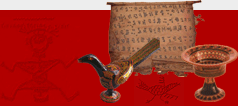|
浅论彝族行业内婚——以贵州威宁雪山、龙街为例
Yi Occupational Endogamy: Examples from Xueshan and Longjie
in Weining, Guizhou
卢春梅 Lu Chunmei
云南民族大学外语学院
【摘要】一般认为民主改革前,彝族传统社会的通婚情况可归纳为:族内婚、等级内婚、家支外婚、姑舅表优先婚和姨表不婚,但笔者认为以等级内婚来描述传统社会中彝族的通婚情况似乎不够准确,因为一些属于同一等级并且满足前述其他通婚条件的族群相互间并不通婚。本文拟以贵州威宁雪山、龙街为例,运用人类学研究方法,初步探讨彝族传统社会中存在的行业内婚。虽然彝族传统社会没有明显的社会分工,但手工业已有一定发展,并在一些支系的生产活动中占到很大比重,如威宁雪山的彝族支系“红彝”,彝语称“腊苟”,解放前大部分以铸铧口为副业;龙街一带的“干彝”,彝语称为“果”,世代以编制竹器为业。他们虽然租种土目的土地,但他们不是“娃子”,有迁徙自由和完整的亲权、婚权,属于自由民阶层,是同一个等级。但是他们不仅不与较高等级的土目通婚,也不与较低等级的“娃子”通婚,甚至“腊苟”和“果”相互间也不通婚。本文拟从行业分工、族群认同和文化模式等方面分析“腊苟”和“果”属于同一等级但彼此间并不通婚这一现象,并得出结论:彝族传统社会的行业分工影响并塑模了同一等级内的通婚圈,进而影响到社会结构的形成。
关键词: 行业内婚 族群认同 文化模式 社会结构
Abstract
It is generally believed that, before the Democratic
Reform, the marriage situation in the traditional Yi society
can be generalized as endogamy, rank endogamy, lineal exogamy,
cross-cousin preferential marriage and matrilineal-cousin
banned marriage. The writer doesn’t think it is accurate
to describe the marriage situation in the traditional Yi
society as rank endogamy, since some groups in this society,
belonging to the same rank and meeting all the other requirements
mentioned above, actually don’t intermarry each other. With
a case from Xueshan and Longjie in Weining County, Guizhou
province, this paper tries to apply the approach of anthropology
to analyze the occupational group endogam in traditional
Yi society. Though there is not apparent social division
of labor in traditional Yi society, handicraft production
has developed to certain extent and weighed a lot in the
life of some groups, such as “HongYi” in Xueshan, called
“lagou” in Yi language, who cast ploughshares as a secondary
occupation, and “GanYi” in Longjie, called “guo” in Yi language,
who made bamboo articles for generations. They were not
“slaves” while leasing the land from “tumu”. They had the
freedom of movement and the whole right of independent kinship
and marriage. They belonged to the same rank—the free rank,
but, besides the fact that they didn’t intermarry either
“tumu” (in higher rank) or “slaves” (in lower rank), “lagou”
and “guo” didn’t intermarry each other. This essay tends
to analyze this phenomenon from the aspects of division
of labor, group identity and culture pattern, etc., and
finally comes to the conclusion that the division of labor
in traditional Yi society has influenced and molded the
marriage circle within a rank, and then has an impact on
the formation of social structure.
Keywords: confined-to-trade marriage─group identity─culture
pattern─social structure
作者简介:
卢春梅,女,彝族,讲师,1999年毕业于南开大学,现任教于云南民族大学外语学院,同时在云南大学人类学系民族学专业攻读博士学位,方向为中国少数民族婚姻家庭。参编过两本大学英语快速阅读教程,已由重庆大学出版社出版;参与译校一本人类学著作“人类学一百年”(待出版)。
About the Author:
Lu Chunmei graduated from Nankai University in 1999, now
works with Foreign Languages School, Yunnan Nationalities
University as a lecturer and is one of the Ph. D candidates
in Anthropology Dept., Yunnan University, majoring in the
marriage and family of Chinese ethnic groups. She has co-compiled
two books on college English fast reading, published by
Chongqing University Press, and has proofread the translation
of a book on anthropology: anthropology 100 years (to be
published).
|





